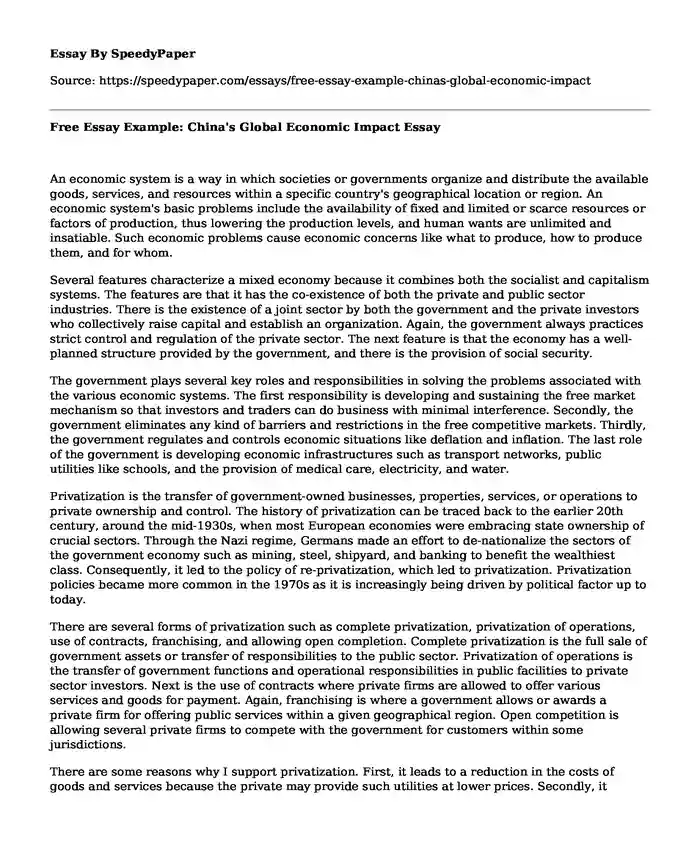
| Type of paper: | Essay |
| Categories: | Policy Economics Government |
| Pages: | 3 |
| Wordcount: | 776 words |
An economic system is a way in which societies or governments organize and distribute the available goods, services, and resources within a specific country's geographical location or region. An economic system's basic problems include the availability of fixed and limited or scarce resources or factors of production, thus lowering the production levels, and human wants are unlimited and insatiable. Such economic problems cause economic concerns like what to produce, how to produce them, and for whom.
Several features characterize a mixed economy because it combines both the socialist and capitalism systems. The features are that it has the co-existence of both the private and public sector industries. There is the existence of a joint sector by both the government and the private investors who collectively raise capital and establish an organization. Again, the government always practices strict control and regulation of the private sector. The next feature is that the economy has a well-planned structure provided by the government, and there is the provision of social security.
The government plays several key roles and responsibilities in solving the problems associated with the various economic systems. The first responsibility is developing and sustaining the free market mechanism so that investors and traders can do business with minimal interference. Secondly, the government eliminates any kind of barriers and restrictions in the free competitive markets. Thirdly, the government regulates and controls economic situations like deflation and inflation. The last role of the government is developing economic infrastructures such as transport networks, public utilities like schools, and the provision of medical care, electricity, and water.
Privatization is the transfer of government-owned businesses, properties, services, or operations to private ownership and control. The history of privatization can be traced back to the earlier 20th century, around the mid-1930s, when most European economies were embracing state ownership of crucial sectors. Through the Nazi regime, Germans made an effort to de-nationalize the sectors of the government economy such as mining, steel, shipyard, and banking to benefit the wealthiest class. Consequently, it led to the policy of re-privatization, which led to privatization. Privatization policies became more common in the 1970s as it is increasingly being driven by political factor up to today.
There are several forms of privatization such as complete privatization, privatization of operations, use of contracts, franchising, and allowing open completion. Complete privatization is the full sale of government assets or transfer of responsibilities to the public sector. Privatization of operations is the transfer of government functions and operational responsibilities in public facilities to private sector investors. Next is the use of contracts where private firms are allowed to offer various services and goods for payment. Again, franchising is where a government allows or awards a private firm for offering public services within a given geographical region. Open competition is allowing several private firms to compete with the government for customers within some jurisdictions.
There are some reasons why I support privatization. First, it leads to a reduction in the costs of goods and services because the private may provide such utilities at lower prices. Secondly, it enables the government to transfer some risks that they cannot bear alone—for example, the capital finance risks in some sectors. Again, privatization leads to the production of quality services. However, I don't support privatization because it leads to the government losing some dividends as the government shifts its control of it. Again, it might lead to the creation of monopolies when there are limited firms.
China has a unique privatization process because it has permitted the continued existence of firms owned by the state while the private sector economy continues to come up with new companies that provide the same goods and services. All hybrids of privatization are allowed to take place at the same time when similar government-owned companies continue to be in operation without a transfer of functions or assets.
References
Li, Z., & Zhong, J. (2020). Impact of economic policy uncertainty shocks on China's financial conditions. Finance Research Letters, 35, 101303. https://books.google.com/books?hl=en&lr=&id=RzUlDwAAQBAJ&oi=fnd&pg=PP1&dq=macro+economics+in+china&ots=TCrUWVQPDo&sig=lYiNEI2oaKO8GnEqNhtxtV5rgZI
Mathew, W. (2018). The Roots of Privatization. https://daily.jstor.org/the-roots-of-privatization/
Nitisha. (2020). Roles of Governments in Economic Systems. https://www.economicsdiscussion.net/government/role-of-government-in-economic-systems/4041
Pettinger, T. (2019). Advantages and Problems of Privatization. https://www.economicshelp.org/blog/501/economics/advantages-of-privatisation/
Zhou, M., Liu, X., & Tang, G. (2018). Effect of urban tourist satisfaction on urban macroeconomics in China: A spatial panel econometric analysis with a spatial Durbin model. Plos one, 13(10), e0206342. https://www.cabdirect.org/cabdirect/abstract/20177200158
Cite this page
Free Essay Example: China's Global Economic Impact. (2024, Jan 23). Retrieved from https://speedypaper.com/essays/free-essay-example-chinas-global-economic-impact
Request Removal
If you are the original author of this essay and no longer wish to have it published on the SpeedyPaper website, please click below to request its removal:
- Free Essay Example on the US-Taiwan-China Relations
- Criminal Law Foundations Evaluation in Our Free Essay
- Essay Sample: US Music Diplomacy in the USSR
- Prison Riot Essay Sample
- Access to Affordable Health Insurance, Free Essay Example
- Essay Sample on Effects of Globalization on Sovereignty and Inequality
- Paper Example - American Industries
Popular categories




